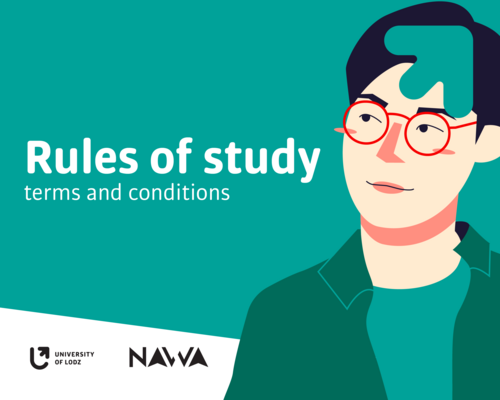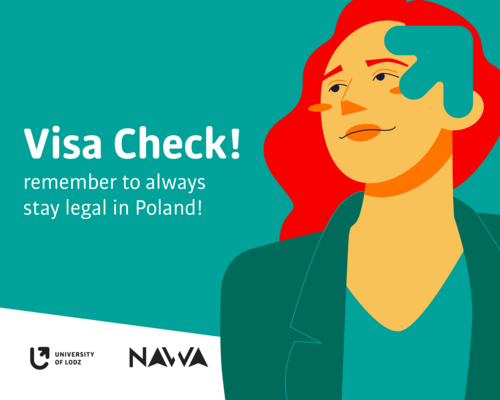- UNIVERSITY OF LODZ
- STUDENT ZONE
- Welcome Point
- During your studies
During your studies
TRANSLATIONS
TRANSLATION OF DOCUMENTS INTO POLISH IS OBLIGATORY!
Official procedures often require certified translations from English into Polish. When applying for studies in Poland, there is usually limited access to sworn translators outside Poland or insufficient time for translations. Therefore, you are asked to visit your Dean’s Office after 2–3 weeks to take your original documents for translation, if not already done.
The following credentials need certified translation for education recognition in Poland:
- High School Certificate with grade sheet.
- Eligibility statement.
After translating the documents, you must bring the translations and the original documents back to the Faculty, and a copy of the translations to IRO. If you are a BA student, please read about the RECOGNITION PROCEDURE. Additionally, you may need certified translations of your foreign-language documents when applying for a Residence Permit. Polish is the (only) official language in Poland.
Candidates with documents from Uzbekistan should contact the Polish Embassy in Tashkent to have their diploma/Attestat translated officially into Polish. After arriving in Poland, candidates will need to obtain a sworn translation into Polish at the Embassy of Uzbekistan in Warsaw.
SCHOLARSHIP
Every student can apply for the Rector’s scholarship (for good grades). Additional points are awarded for scientific, sport, or art achievements. This scholarship is available from the 2nd year of studies. The unit responsible for scholarships is the Social Affairs Centre for Students and Doctoral Students (in Polish: Centrum Obsługi Spraw Społecznych i Socjalnych Studentów i Doktorantów).
RULES OF STUDY
Our academic community is founded on mutual respect, dignity, and the protection of the good name of the University of Lodz. As a student at our university, you are expected to uphold these values. From the moment you join our community, certain rules must be followed, and in return, the university has obligations towards you. All of these details are outlined in the Rules of Study at the University of Lodz.

One of the student's obligations is to submit credit assignments, such as essays or reports. These works must be written independently by the students. While quoting fragments from other sources is allowed, it must be clearly indicated. Copying other people's work is strictly forbidden. Lecturers have the right to upload your assignments to an anti-plagiarism system to compare them with works available on the Internet or those prepared by other students. Detection of plagiarism—using another person's work and presenting it as your own—may result not only in failing the course but also in receiving a formal reprimand from the Rector.
RESIDENCY REQUIREMENTS
CHECK YOUR VISA
Always carry your identification document while living in Poland. It's essential to know how long you can stay in Poland without a residence permit. If you plan to travel outside Poland, such as for a weekend or holiday trip, first check the type of visa you have. Not all Polish visas allow free travel in the EU—some only permit travel to Poland and back home without stops.
D-type visas are the most common for students (C-type, or Schengen transit visas, are uncommon). If your D-type visa has "MULT" instead of a number of entries, it allows you to travel to other countries in the Schengen Area (plus Iceland, Norway, Liechtenstein, and Switzerland) if your stay there does not exceed 90 days per half year. If your visa shows “02” as the number of entries (rare), you can only enter Poland twice during the visa validity. Be cautious if traveling, especially if you've already entered Poland once.
A "01" as the number of entries means your D-type visa is only valid for your trip to Poland and back to your home country. Avoid traveling to neighboring countries with this type of visa.
If your visa validity date is before the end of your planned study period, don't panic. Learn how to apply for a temporary residence permit in Łódź. Alternatively, you can apply for a new visa to cover the upcoming study period at a Polish Consulate or Embassy abroad (in your home country or where there is an Embassy appropriate for your citizenship).
The process of applying for a temporary residence permit usually takes about 6 months, or even longer. It is advisable to apply about 3 months before your visa expires. If your visa expires while your residence permit application is being processed, the Governor’s Office (Urząd Wojewódzki) will stamp your passport with information about your application submission. This stamp means your stay in Poland is legal, but be aware that you cannot travel outside Poland with this stamp—travel is only permitted with a valid visa or residence permit.

PREPARING FOR VISA APPLICATION
After completing your first academic year
As the academic year draws to a close (we recommend passing all exams by June!), many of you may plan to visit your home country for the holidays. For those needing a new student visa due to the expiration of the first one, preparation is key before heading home.
Here’s what you need to gather (original paper versions) for the Polish Embassy, as of September 2023:
- Student Status Confirmation: Include your grade sheet and, if applicable, proof of tuition fee payment. Obtain a document from your Dean’s office confirming your acceptance into the next academic year or your re-take examinations scheduled for September. Ensure you receive these documents from the Dean’s Office by the end of June, as July and August are holiday months.
- Proof of Accommodation: Provide a tenancy contract specifying monthly rental fees. If you live in a dorm, obtain a document from the manager or reception desk detailing the dorm address and monthly accommodation fees.
- Proof of Funds:
- Return travel: prepare funds equivalent to:
200 PLN for countries bordering Poland.
2500 PLN for non-EU countries located farther away. - Living expenses: demonstrate a minimum of 776 PLN per month of stay.
- Accommodation expenses: calculate the total annual dorm fee or monthly rent multiplied by the number of months of stay.
- Show a minimum of PLN 776 for each month of stay: 776 PLN * 12 (months of stay) = 9312 PLN.
- Financial means documentation: provide evidence such as a credit card statement or a sponsorship letter.
- Return travel: prepare funds equivalent to:
The amount of monthly rent or dorm fee multiplied by the number of months of stay. E.g. If your UL dorm fee is PLN 440 per month, the total cost of accommodation per year will be: PLN 440 * 12 months = 5280 PLN.
Before applying for your visa, be sure to visit the website of the Polish Embassy in your country for detailed requirements. The information provided here is to help you prepare for your application and should not substitute for official guidance. Additionally, there may be other documents required by the Embassy.
Residence permit
Residence Card (Polish: Karta Pobytu) for Temporary Stay in Poland
If your visa is set to expire before your planned departure from Poland, it's essential to apply for a residence permit in Łódź. Ideally, begin the process 3–5 months before your visa expiration date.
Where to apply: Migration Office, ul. Piotrkowska 103 (Łódzki Urząd Wojewódzki, oddział Cudzoziemców).
Application process: you can submit your documents in person or by sending them via registered mail. Ensure all required documents are included.
Important steps:
- Obtain your grade sheet from the Faculty.
- Maintain the same mailbox and phone number for the next six months. If you have a different postal address, attach it on a separate sheet.
- If you receive an appointment, double-check your contact details.
Financial Requirements: you will need PLN 365 for fees (actual expenditure) and approximately PLN 16,000 for dorm residents (funds secured in your account or credit card limit, to be shown).
Ensure you have all necessary documentation and funds prepared before submitting your application to the Migration Office.
MOODLE TRAININGS & P.E. CLASSES
Moodle Trainings
Please remember to complete the following mandatory trainings on Moodle:
- Occupational Safety and Health Training.
- Protection of Intellectual Property Course.
- Library Instruction.
These trainings and classes are essential for your academic and personal development at the University. Finish them via the Moodle online platform: www.moodle.uni.lodz.pl Access the platform with your @edu.uni.lodz.pl log in data. In case of questions please ask your Dean’s Office.
By failing any of these trainings you may fail your first semester!
P.E. CLASSES
The PE class (Polish: WF) at the University of Lodz consists of a 30-hour course with ECTS credits. Please check your first-semester timetable for PE class details. If available, sign up via the USOS system. For any inquiries, reach out to the Sports Centre office located at ul. Styrska 5.
Low-Energy Sports Options
If you are feeling unwell or are unable to participate in regular sports activities, you may, after consulting your doctor, opt for low-energy sports such as:
- Contact Bridge
- Yoga
- Relaxation Activities
- Nordic Walking
Please contact the Sports Centre to inquire about signing up for low-energy sports and for more details on how to participate.
USEFUL GLOSSARY
Polish words used at uni → English translation
Przedmiot → Course/ Module
Kierunek → Programme/ Field of Study
Wydział → Faculty/ Department/ School of…
Zajęcia → Classes/ Course
Zaliczenie → Credit/ Pass/ Completion
Niezaliczony → Uncredited/ Failed/ Incomplete
Sesja → Exam session/ Period
Wykładowca → (Academic) Teacher/ Lecturer
Dyżur → Office hours/ Feedback slots
Rok → Study year/ Class group of the same starter year
Important! Generally, classes can be either a practice or a lecture. Check carefully how each class is conducted!
Ćwiczenia are tutorial, practice, or discussion classes offered at the university. They are typically conducted by younger or lower-ranking teachers and are accessible to students on a regular basis.
Class structure:
- Groups are small, typically ranging from 5 to 20 students.
- Attendance is rigorously monitored and often mandatory.
- Completion of Ćwiczenia may be a prerequisite for taking the lecture exam of the same subject.
- Various passing requirements may apply, depending on the specific course and instructor.
Importance: attending Ćwiczenia is crucial for deepening understanding through practical exercises and discussions, which complement theoretical lectures and help prepare for examinations.
Wykłady are standard lectures offered at the university. They are conducted by high-ranking professors who are often inaccessible during lecture times, but students are encouraged to attend their office hours for further discussion.
Class structure:
- Groups in wykłady tend to be large, accommodating up to 100 students or more.
- Attendance is generally not rigorously checked.
- Some wykłady may require signing up for corresponding Ćwiczenia (practice classes) within the same field.
- Wykłady typically cover extensive course material that forms the basis for examinations.
Importance: attending wykłady provides foundational knowledge delivered by experienced professors. Although attendance is not strictly monitored, active participation can enhance understanding and preparation for exams, especially when coupled with Ćwiczenia sessions that offer practical applications of the lecture content.
ONLINE MEETINGS WITH IRO
With new academic year starting, IRO plans to hold online meetings for newcomers. Each meeting will cover different topic related to your studies or stay in Poland. More info: TBA
The Project funded by the Polish National Agency for Academic Exchange under the Welcome to Poland Programme (2022)

